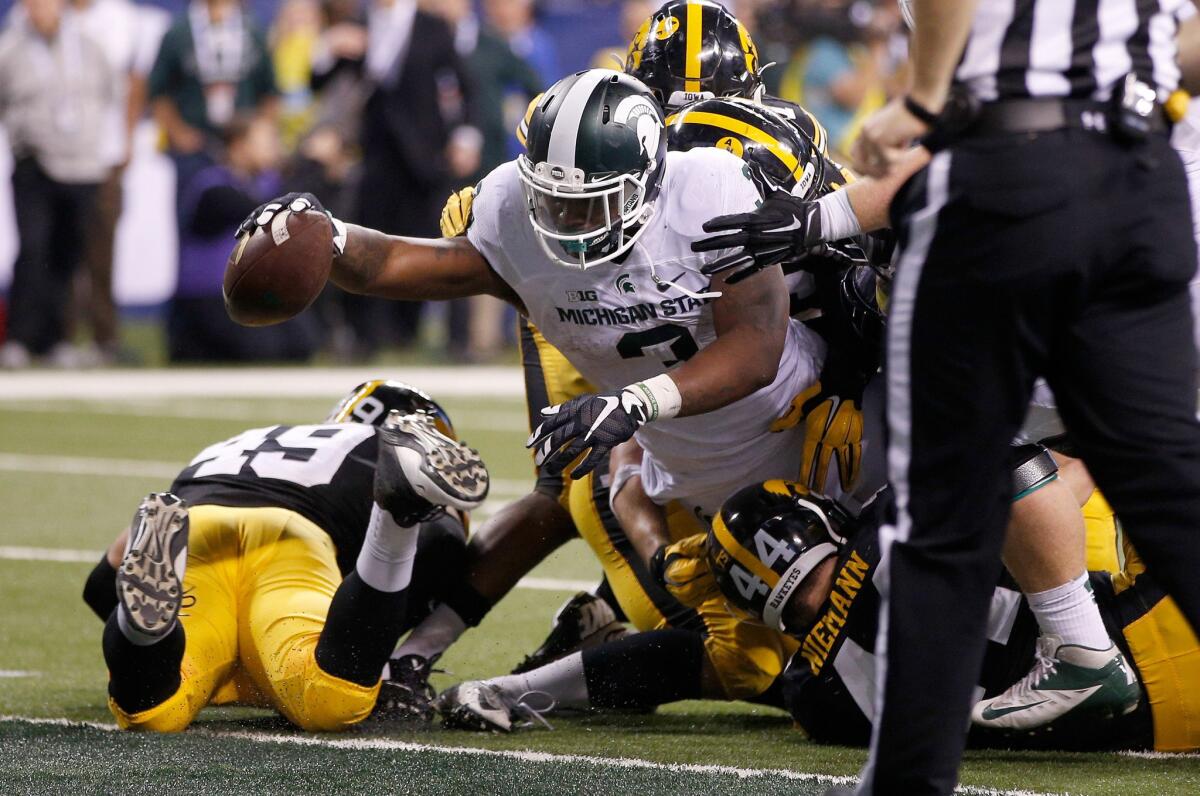College football offers no drama with chosen playoff teams

Michigan State running back LJ Scott reaches into the end zone for the winning score against Iowa in the Big Ten Championship.
- Share via
If you wanted suspense on Sunday you were better off renting “Rear Window” by Alfred Hitchcock.
There was little edge-of-your-seat action in college football, once known for its dramatic pauses and soap-opera organ music.
The more they get this right, the more they get it, well, different.
Sixteen years of hairpin turns under the old Bowl Championship Series have parted way to calm, order and fairness.
What kind of legitimate outfit are they running here?
The first year of the College Football Playoff had very little taint because it insisted on featuring an esteemed body of panelists who threatened to dignify the entire process.
The committee had to decide only whether to jump one-loss Ohio State, after a bad home loss to Virginia Tech, over whichever team was going to be named the Big 12 champion.
Even that, though, worked itself out before the final Sunday morning prayer breakfast.
Ohio State drilled Wisconsin, 59-0, in the Big Ten title game and the Big 12 elected to crown two champions, Baylor and Texas Christian.
The committee then basically said, “If you can’t decide, we will.”
It put Ohio State in, left the Big 12 out, and then watched the Buckeyes defeat No. 1 and No. 2 on their way to the national title.
This year was even easier.
There were no dark circles under the eyes of committee Chair Jeff Long as he emerged from a Dallas meeting room to announce Clemson, Alabama, Michigan State and Oklahoma as the four playoff teams.
You could almost, in the background, make out other committee members finishing up leisurely games of backgammon.
ESPN had a half-hour to fill before the unveiling and tried to stir up whether Michigan State, or Oklahoma, deserved to be No. 3.
Long played along while looking at his watch and mentally preparing a grocery list before offering, “Well, that’s probably where we spent most of the time. Great discussion, great debate.”
Long then killed more buzz by saying there was no debate about which team deserved the top seeding.
“Not this week,” Long told ESPN. “Clearly, Clemson No.1.”
Things might have been different had Alabama or, better yet, Clemson lost on Saturday. The latter would have thrown open a one-spot debate involving two-loss Stanford, defending national champion Ohio State, or North Carolina.
That didn’t happen, though, and everyone got a good night’s sleep.
Sunday was a nice day for people who appreciate that college football is doing a better job with its postseason than it did when USC was No. 1 in both polls but couldn’t play for the title.
It was not a good day for coaches such as Stanford’s David Shaw, who is a proponent of expanding the field to eight teams.
That, of course, would have put his sixth-ranked team in this year’s rotation.
Change doesn’t come that fast, though, and this is only the second year in a 12-year contract.
The Pac-12 was left out of the system despite being, unquestionably, one of the nation’s top four conferences.
The system can’t be fair so long as it has five major leagues, plus independent Notre Dame, fighting for four playoff slots.
The field can’t be level if conferences don’t play by the same set of rules.
“It will never be precise,” Pac-12 Commissioner Larry Scott acknowledged before Saturday’s Stanford-USC game at Levi’s Stadium. “There are too many differences.”
Some of those differences include:
— The Southeastern Conference playing an eight-game league schedule in a 14-team league, while the Pac-12 plays nine games in a 12-team league.
— Notre Dame refusing to join a conference and the Big 12 not playing a conference title game.
— North Carolina having a chance to make this year’s playoff despite playing two Football Championship Subdivision opponents in nonconference. Two of Stanford’s nonconference opponents were Northwestern and Notre Dame.
“I’ve described it as everybody’s running a race, but over a slightly different course,” Scott said.
It helps that the Big Ten is moving to a nine-game league schedule next year.
Scott thinks his conference is leading the way on what the model should be, even if it costs one of his teams a playoff spot every other year.
Stanford didn’t have to open the season at Northwestern, which turned out to be 10-2, but it did. Had the Cardinal played Delaware-by-the-Sea State it may now be preparing for a national semifinal game.
“I believe the Pac-12 is on the forefront of trying to do it the right way,” Scott said.
He thinks the committee is putting a precedent on competition and scheduling. Some years, though, it still doesn’t work out in your favor.
Last year the Big 12 was hurt by not staging a title game. This year, with Oklahoma, it probably helped.
“Oklahoma didn’t play,” Long said. “So they didn’t have that risk reward.”
Scott is not a proponent of expanding the playoff field to eight. It should be noted that nothing, in the first two years, has created the level of controversy that could launch a movement.
The template is in place to go from four teams to eight whenever that might become necessary.
It is not necessary yet.
The Rose Bowl got Stanford against a sunshine-starved Iowa program that has not visited Pasadena since 1991.
The Fiesta Bowl features Ohio State vs. Notre Dame, otherwise known as the two loves of Urban Meyer’s life.
USC has a Rose Bowl matchup, too, against Wisconsin in the Holiday Bowl.
And UCLA plays Nebraska in a Foster Farms bowl that should pair well with a white-wine cooler.
It will take calamity, not quiet, to force dramatic change.
It took 16 years to junk the junky BCS.
This weekend did nothing to stoke, or provoke. It was, as the song goes, “easy as Sunday morning.”
Former SEC commissioner Mike Slive had a term for any BCS year that didn’t end with screaming and the threat of a lawsuit.
He called it “peace in the valley.”
So now, until further unrest, we’ll rest in peace.
More to Read
Go beyond the scoreboard
Get the latest on L.A.'s teams in the daily Sports Report newsletter.
You may occasionally receive promotional content from the Los Angeles Times.











